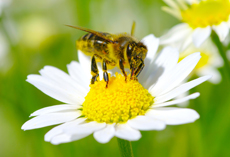Tips to avoid getting stung
 Summer is here...and so are the stinging insects including honey bees, wasps, hornets and yellow jackets.
Summer is here...and so are the stinging insects including honey bees, wasps, hornets and yellow jackets.
To avoid getting a sting:
- Don’t walk barefoot in the grass
- Keep an eye out for stinging insects when gardening, mowing, or other outdoor activities. For example, yellow jackets like to build nests underground, in the walls and cracks of buildings or in woodpiles. Hornets can build nests in trees and shrubs, and paper wasps can live in circular combs under eaves, shrubs or woodpiles.
- Avoid drinking from open containers outside since stinging insects can crawl inside of drink cans and other containers
- Keep lids on garbage cans
- Avoid wearing bright-colored clothing and perfumes as these may attract stinging insects
If you are stung, the most common reaction is pain, redness and swelling (potentially a lot of swelling) at the site of the sting. People who are allergic to stinging insect venom can have a more severe reaction called anaphylaxis. The symptoms of anaphylaxis can include hives, swelling of the face, tongue and/or throat, difficulty breathing, chest tightness, dizziness and even a loss of consciousness. This kind of reaction requires immediate medical attention.
If you have an allergic reaction to an insect sting, you have a high risk of having a similar or more severe reaction if you are stung again. An allergist can help determine if you may need venom skin testing and possibly venom allergy shots.